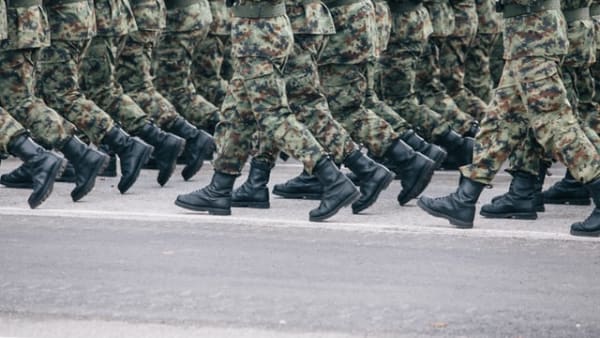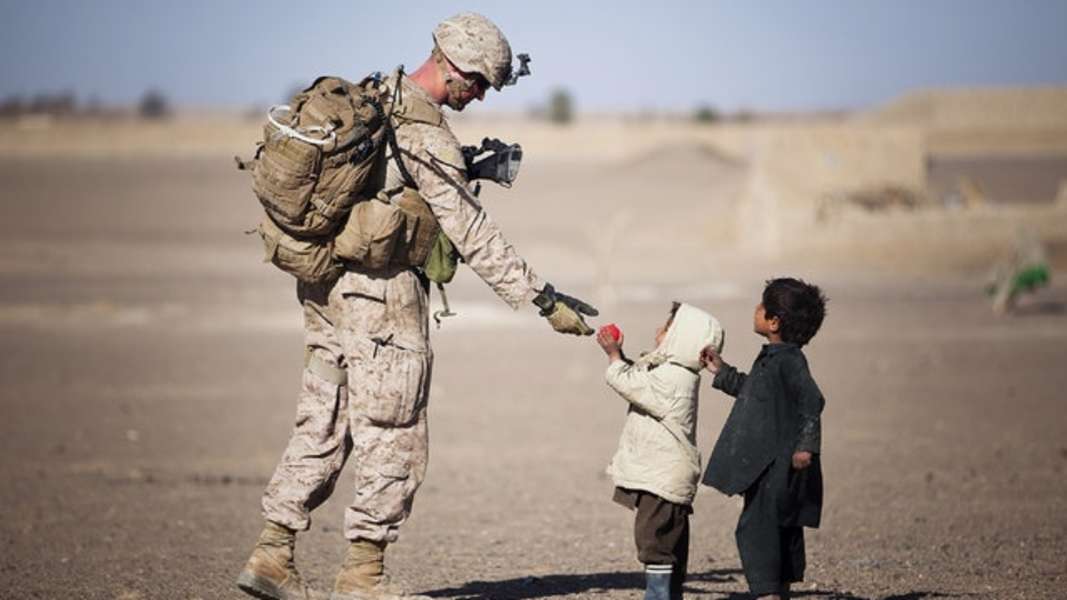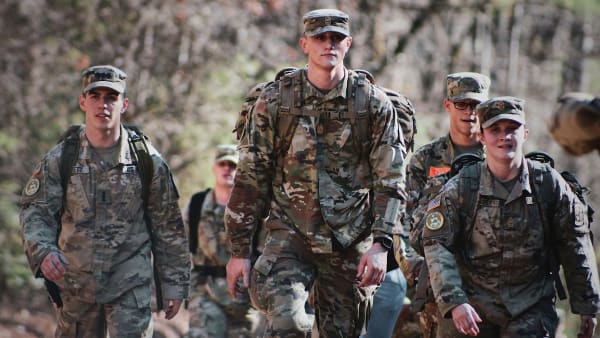The British Army is a formidable fighting force and its ranks reflect this. From the highest-ranking General to a Private, every soldier in the British Army has a role to play.
This article contains a list of all British Army ranks from highest to lowest, with descriptions of what each rank confers and requires.
Officer Ranks
Field Marshal (five-star)
Field Marshal is the highest rank to which a general officer in the British Army can be promoted. Field marshals are usually appointed to command a corps or division. The rank was first introduced into British service in 1736 and is now an honorary rather than active rank.
Field Marshals are typically highly skilled in a variety of areas. They are prime strategists, and are frequently able to act quickly and decisively to maintain a strategic advantage during an emergency. Excellent leadership skills are necessary to effectively lead and motivate troops, as well as manage large-scale operations.
This role requires a deep understanding of military history and doctrine, which allows Field Marshals to make informed decisions when it comes to planning future campaigns. Physical fitness is also a key requirement, since Field Marshals need to be able to withstand the stresses of combat.
General (four-star)
A General leads and manages a brigade of around 4,000 soldiers. They must be highly skilled at planning, directing and supporting operations, as well as personnel policy and administration.
The ability to set goals and meet them in military operations is crucial for generals, and proficiency in strategic planning focuses directly on the achievement of those goals.
Additionally, Generals must have excellent communication and interpersonal skills, as they will often interact with government officials, other military leaders, and members of the public.
Lieutenant General (three-star)
Lieutenant General is the third-highest rank in the British Army. Their role is to manage and lead large-scale operations, develop strategies and exercise command and control over brigades or divisions.
To carry out their tasks effectively, they must have exceptional leadership and management skills. Communication and problem-solving skills are also necessary for Lieutenant Generals, since they must be able to work effectively with other senior military officers as well as civilian leaders.
Major General (two-star)
A Major General is a senior commander who oversees brigade-level operations. They must be able to effectively manage resources, personnel and equipment to achieve strategic objectives.
Additionally, Major Generals must be well versed in military strategy and have strong leadership skills. They are required to make quick decisions in times of crisis and effectively communicate with their subordinates.
In peacetime, the Major General is primarily responsible for staff work and for monitoring and directing operations as required. In wartime, they may be called upon to plan and execute military operations.
Major Generals typically serve for around six years, after which they may be promoted to Lieutenant General or retire from the Army.
Brigadier (one-star)
A Brigadier’s chief function is supervising the activities of troops, recognizing what resources are available, and planning how best to use these resources.
These actions require excellent leadership qualities, the capacity for quick decisions, and effective military strategy knowledge. They also demand the ability to communicate with the troops and manage resources wisely.
Colonel
The role of a Colonel is to support field commands at the battalion and brigade level, ensuring the Army’s administrative needs are met. This includes overseeing personnel, finance, logistics and infrastructure.
Colonels also provide advice and guidance to junior officers. They typically serve for three years before being promoted to Brigadier.
Successful Colonels have excellent communication skills, as well as strong strategic planning abilities. The ability to think on your feet and make quick decisions is also essential, as is an understanding of military law and procedure.
Finally, a good sense of teamwork and discipline are also key traits for an efficient Colonel.
Lieutenant Colonel
A Lieutenant Colonel is a senior leader who commands a regiment. They are responsible for the training and discipline of their troops, as well as leading them into battle. Success in this role is determined by a number of skills.
Firstly, Lieutenant Colonels need to be excellent leaders, able to inspire their troops and make quick decisions in difficult situations. They also need to be good strategists, able to plan and execute complex operations.
Strong communication skills are essential, as they will need to be able to give clear orders and relay information to their subordinates. Finally, they must be physically fit and capable of leading their troops on long marches or through combat.
Major
The responsibilities of this role include training and leading soldiers, developing plans for operations, and overseeing the execution of missions. Majors must be able to think rationally and make quick decisions in order to keep their troops safe.
Some of the fundamental skills needed by efficient majors include critical thinking, problem-solving, leadership, communication, and teamwork. Additionally, majors must be able to analyze information and make decisions quickly to solve complex problems.
Captain
A captain is the second-in-command of a sub-unit sized at around 120 soldiers. The primary responsibility of this position is to make decisions and plan operations to achieve military goals.
Exceptional leadership skills and the ability to motivate troops are essential for this role, as well as making quick and effective decisions in difficult situations. Communication and problem-solving skills are also essential, as is the ability to work under pressure in unexpected situations.
Lieutenant
A Lieutenant in the British Army is responsible for a wide range of tasks, from commanding a platoon of soldiers to overseeing administrative and logistical work.
Lieutenants need to have excellent leadership and communication skills, as well as a strong understanding of military structure and protocol. As with all commissioned officers, Lieutenants must be able to exercise independent judgement and take decisions in difficult situations.
Second Lieutenant
A Second Lieutenant is responsible for around 30 soldiers, leading them in operations and exercises. The role is highly varied, with duties including commanding troops on operations, managing personnel and equipment, and liaising with other military and civilian organisations.
Second Lieutenants are also involved in training new recruits to the army. This is a demanding but highly rewarding role, requiring excellent leadership skills, tactical knowledge, and strength of character.
Officer Cadet
An Officer Cadet is someone who is training to become an Officer. They go through a rigorous training program that is designed to test their physical and mental abilities This program includes endurance exercises, strength training, and tactical manoeuvres.
To be successful, Officer Cadets are expected to be exemplary soldiers, and possess strong leadership skills that will enable them to efficiently lead troops in battle or during training exercises
Soldier Ranks
Warrant Officer Class 1
A Warrant Officer Class 1 is responsible for training and mentoring junior officers and soldiers, as well as providing support to their commanding officer. They are proficient in a variety of crucial skills that are valuable for the efficient operation of a unit.
Some of these skills include leadership, management, administration and technical expertise. In addition to their particular experience, they may have technical knowledge of certain trades, such as engineering or signals.
Warrant Officer Class 2
A Warrant Officer Class 2 is a highly skilled and versatile soldier. They are experts in their field, and can be relied upon to carry out any task that is asked of them.
They must possess the ability to demonstrate superior tactical and strategic thinking skills to lead and motivate others, strong communication and interpersonal skills, and strong problem-solving skills.
These skills allow a Warrant Officer Class 2 to effectively carry out their duties, whether it is commanding a unit or providing specialist support to a unit. They are an essential part of the British Army and contribute greatly to its success.
Staff Sergeant
The Staff Sergeant is responsible for leading and managing troops. Efficient Staff Sergeants must be able to motivate and inspire other soldiers, as well as coordinate and direct their efforts.
This role requires proficiency in basic military skills such as firing weapons, moving through rough terrain, and setting up camp. Additionally, Staff Sergeants must be knowledgeable about the chain of command and how to navigate through it.
Sergeant
Sergeants are the backbone of the British Army, playing a vital role in both combat and non-combat operations. They are highly trained and skilled in a range of disciplines, from logistics to communication to first aid.
Courage and intelligence are key attributes needed by Sergeants to encourage and inspire their subordinates on the battlefield, and act quickly on decisions while facing tough circumstances.
Corporal
The role of a Corporal in the British Army is to lead and manage soldiers in their unit. They are responsible for the discipline, training and welfare of their troops. Strong problem-solving skills are crucial for corporals to carry out battlefield operations and provide support to officers.
They may be called upon to command a section of troops in combat or take part in reconnaissance missions. To complete these tasks effectively, they need excellent communication and decision-making skills.
Lance Corporal
Lance Corporals carry out essential tasks, such as providing support to officers and other ranks, maintaining equipment and carrying out basic medical procedures.
Successful Lance Corporals possess a range of important skills. These include being able to operate effectively in a team, taking orders and working within a chain of command. They must also be able to handle weapons and equipment safely and be physically fit enough to take part in operations.
Private
Privates are essential members of the army, and they can make a real difference when it comes to achieving success on the battlefield. Their role includes a range of tasks, from operating and maintaining vehicles and weapons to providing first aid and security.
The skills needed by an efficient Private can vary depending on the type of unit they are assigned. However, some of the most important abilities include teamwork, discipline, and self-reliance.
Privates must also be able to follow orders quickly and accurately, but they also need to be able to take initiative when necessary.
Are you interested in a career in the British Army? If so, you’ll need to pass selection assessments. These examine skills such as critical thinking, deductive reasoning, numerical fluency and the ability to remain calm under pressure: all crucial for any occupation in the armed forces.
Check out our BARB Test British Army to learn more about how these tests work, and practice some realistic samples.







